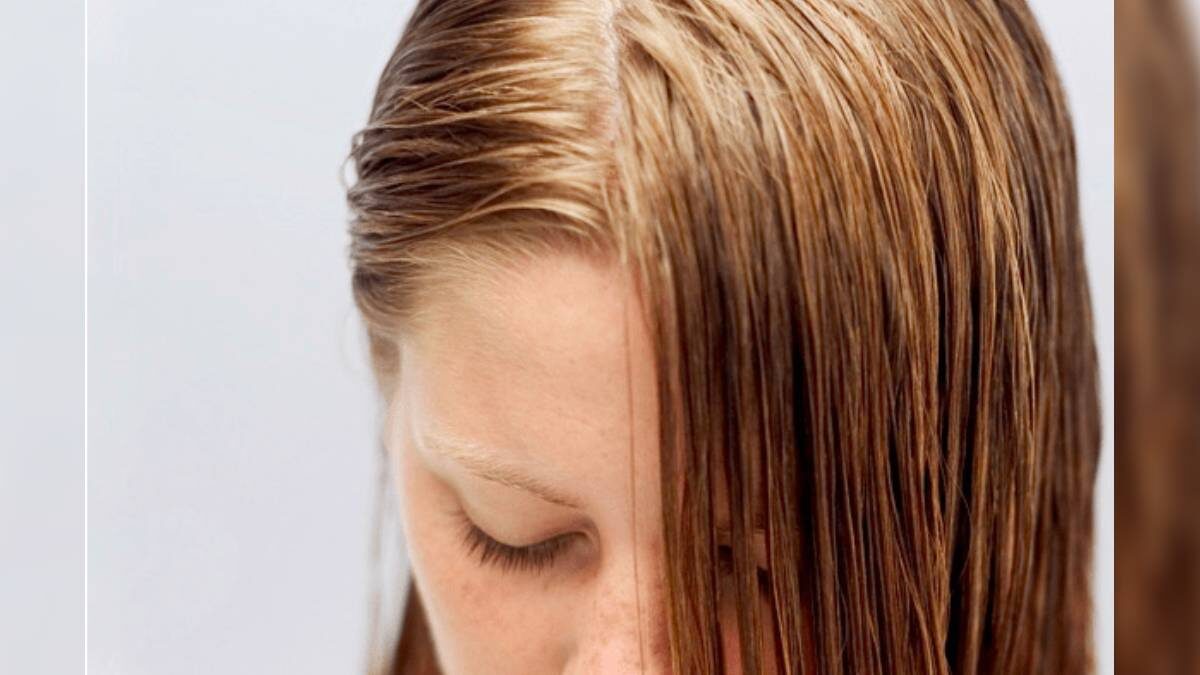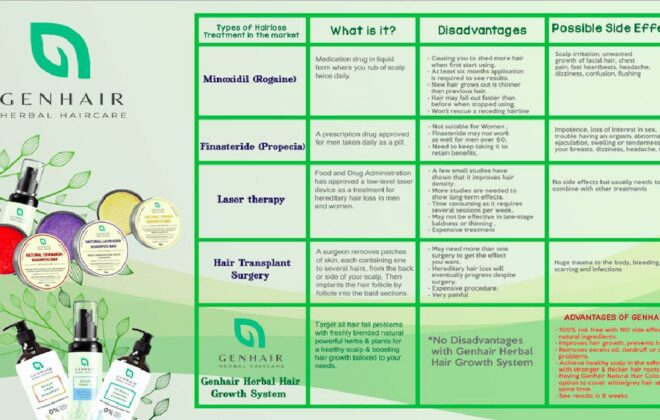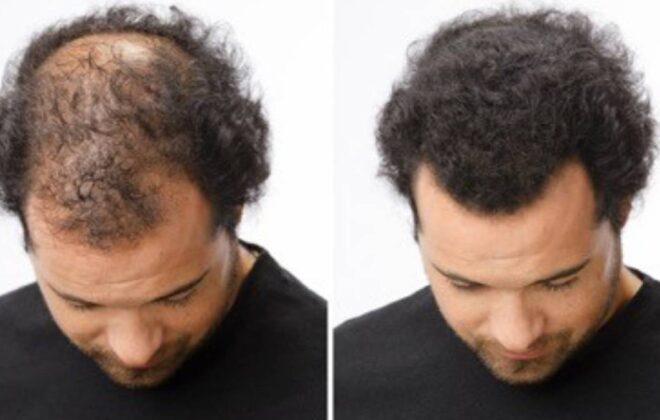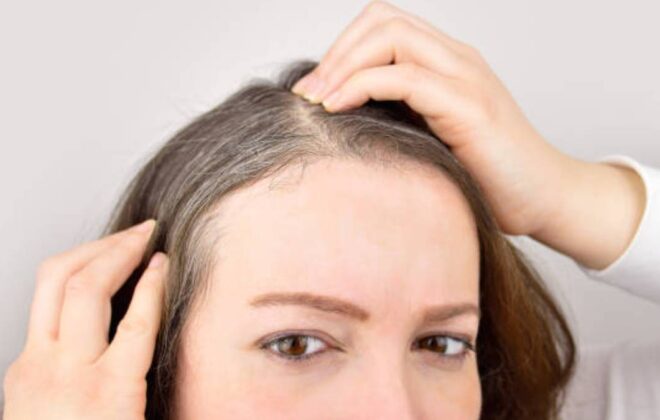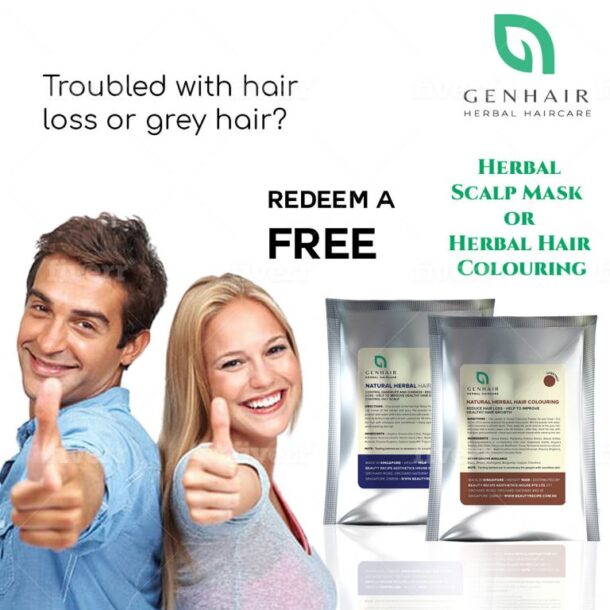How to Diagnose Your Scalp Condition for Hair Growth to Guarantee Your Success
How to diagnose your Scalp Condition for Hair Growth so it can guarantees success?
Growing hair is like growing crops; to reap a good harvest, you must have a good foundation and nutrient-rich soil before you add fertilisers. Similarly, understanding your scalp condition is essential to achieving a healthy, well-balanced scalp that allows your hair to grow naturally — without the need to take or apply any medications that might cause side effects or further complicate your scalp health.
Many of the hair growth products available on the market promise you the moon but contain numerous chemicals that might cause more sensitive-scalp problems than they solve. Prescribed medicated shampoos and sprays contain many chemicals that cause side effects and often induce even more hair loss when you stop using them.
Our solution? Let your hair grow naturally after understanding and solving your scalp issues from this article. Often the way to achieve a healthier scalp is to switch to natural shampoos with herbs or plants that directly target your scalp condition.
Shampoos that contain LS/SLES or silicone are detrimental to your scalp health, especially when these shampoos do not contain any paraben.
Different Types of Scalp Conditions
Several scalp conditions lead to hair loss; so, it is essential to know about them to prevent hair loss or have a healthy scalp to start hair growth.
Every scalp condition has its causes and reasons to appear, and if they are not taken care of, they will likely lead to worse conditions. Just for you, we compiled a complete overview of the different types of scalp conditions. So keep reading…
Scalp Condition 1. Clogged Pores & Oily Scalp
Those with oily scalps will find their hair limp and without volume. Clogged pores, if not taken care of, will lead to pimple-like bumps on the scalp, followed by acne. And yes, you can have breakouts on your scalp when your pores are clogged and oily.
Why does this happen?
This mainly happens to people with excess oil and sweat glands. It can also happen if you are not washing your hair regularly, especially after working out. Using the wrong shampoo causes excessive oil production. If you tend to sweat a lot, wear head coverings/caps/hats, or do not wash your hair correctly, you will have clogged pores.
What causes hair loss?
Bacteria trapped in the pores can cause the pores to be infected, resulting in acne. When there are oil-clogged, small patches of acne or pimples on your scalp, these itchy, sore of make your hair fall out easily. And clogged pores block your follicles, making it hard for your hair to grow.
Plant Extracts That Deal with Clogged Pores
- Mint: Helps maintain the natural pH of your scalp, which controls excessive oil production. Mint stimulates your senses, your circulation, and your hair follicles, providing an energy boost that dull hair responds to.
- Jasmine: An antiseptic that purifies the scalp of bacteria and build-up. The natural healing properties found in jasmine work to reduce and eliminate the possibility of infections and scalp conditions like pimples and acne.
Scalp Condition 2. Dry Scalp or Dandruff
One of the most common scalp conditions is dry scalp. A dry scalp mostly leads to dandruff if left untreated. Dandruff is little white flakes that appear on your scalp and are especially visible on your black clothing. Dandruff forms from dry or dead skin that builds up on your scalp.
Why does this happen?
Insufficient moisture on your scalp, or even dead skin on your scalp, is not dangerous, but if it increases, causing some infections that can lead to scalp itchiness and redness, which we will discuss more towards the end of the article.
What causes your hair to fall out?
Scalp itchiness due to dead skin makes the hair follicles and roots weaker. This weakness can become even more severe when you are regularly washing and combing your hair every single day. When your scalp is prone to dandruff, avoid washing it too much, and use only those shampoo that is made for eliminating dandruff.
Plant Extracts That Deal With Dry Scalp/Dandruff
- Seaweed: Naturally hydrates and helps control flaky scalps. It is powerfully effective for hair growth due to its high content of vitamins, minerals, and omega-3 fatty acids, which help the hair follicles to stimulate hair growth. Omega-3s in seaweed also improve blood circulation in the scalp, which is essential for hair growth. They also contain iron and zinc, which help maintain a healthy level of hair production.
- Calendula Flower: Hydrates dry scalps, removes dandruff, and regenerates the condition of the scalp. Its regenerative properties help the hair follicles to grow abundantly, allowing for a thicker mane. The antioxidants help protect the hair and scalp against cell-damaging free radicals.
Scalp Condition 3. Sensitive Scalp / Seborrheic Dermatitis
Mild sensitive scalp condition can begin as redness like the above photo, along with excessive oil that can lead to Seborrheic Dermatitis, which is a form of rash that mainly affects the scalp. Seborrheic Dermatitis causes scaly patches, red skin, and stubborn dandruff. Seborrheic Dermatitis can also affect oily areas of the body, such as the face, sides of the nose, eyebrows, ears, eyelids, and chest.
Why does it happen?
Although the doctors have been unable to figure out why Seborrheic Dermatitis scalp happens, most probably, it is due to a yeast (fungus) called Malassezia, which is in the oil secretion on the skin or an irregular immune-system response.
What causes your hair to fall out?
As soon as it increases the oil secretion in your scalp, the results of hair loss emerge. The scaly form of dry skin patches on the scalp will also cause significant hair loss.
Plant Extracts That Deal With Sensitive/Seborrheic Dermatitis
- Honey: Has antibacterial properties and is antifungal and high in antioxidants and nutrients. Seals moisture, reduces breakage, strengthens hair roots, unclogs pores, and cleanses scalp from dandruff and infections.
- Olive Oil: Another significant natural extract that you can use to treat Seborrheic Dermatitis Condition is olive oil. It has antibacterial, antifungal, and has anti-inflammatory benefits.
Scalp Condition 4. Psoriasis
Psoriasis is a common skin condition that speeds up the life cycle of skin cells, causing them to build up rapidly on the surface of the skin to form scaly and red patches that are itchy and sometimes painful.
Why does it happen?
Doctors believe that it comes from something wrong with your immune system that causes skin cells to grow too quickly and build up into patches.
How does it cause your hair to fall out?
It is evident from the description that the itchiness in your scalp and the appearance of specific skin patches can give rise to hair loss. This hair loss can become even more severe when skin patches of your scalp turn red.
Plant Extracts That Deal With Psoriasis
- Rose Water: Soothes, moisturises, and stabilizes the hair’s pH balance because its pH resembles that of your hair. It can aid in repairing your hair’s damaged porosity. It acts as an anti-inflammatory, and with its natural antiseptic properties, it can reduce or lessen dandruff caused by fungal infections.
- Green Tea: Rich in antioxidants and nutrients, green tea promotes blood circulation, and it helps to fight scalp dryness and dandruff.
Scalp Condition 5. Ringworm
Ringworm scalp is a fungal infection that can appear in your scalp or even at hair shafts. Ringworm is categorized into different stages, and the symptoms might vary accordingly. It usually appears on the scaly or bald patches of your head.
Why does it happen?
Ringworms most often take place due to the infection of skin patches in your scalp by fungus. As the patches expand, the infection will continue to get bigger. It can start as patches appearing with small black dots. Some other significant symptoms can be the painful area of your scalp or fragile hairs.
How does it cause your hair to fall out?
Having fragile hairs from ringworm is the leading cause of hair loss. The presence of black dots in patches weakens the hair roots.
Plant Extracts That Deal With Ringworms
Lavender: Antimicrobial, helps prevent or kill head lice, helps curb skin inflammation. It helps to treat itchy scalp and controls dandruff and infections. It helps promote hair growth, produces a calming effect, and has a divine fragrance.
Jasmine Flower: An antiseptic that purifies the scalp of bacteria and build-up. The natural healing properties found in jasmine work to eliminate and reduce the possibility of infections.
Scalp Condition 6. Folliculitis
Folliculitis is a form of inflammation and infection of the hair follicles. Severely damaged hair follicles can lead to bacteria and fungi. Sometimes, severely untreated clogged pores might lead to Folliculitis.
Why does it happen?
Damage to the hair follicles on your scalp can be caused by:
- Frequently scratching or rubbing your head
- Tugging on or twisting your hair
- Wearing hairstyles that pull your hair, such as tight ponytails or braids
- Frequently wearing hats / scarves
- Shaving your head
- Wearing sports helmets
- Using a lot of hair products, which can build up over time
How does it cause your hair to fall out?
Folliculitis can cause clusters of red, pimple-like bumps on your skin. The primary symptoms are scalp itchiness or a stinging and burning sensation. As soon as the infection starts to spread to the rest of the other hair follicles, it might cause scarring or even permanent hair loss if left untreated.
Plant Extracts That Deal With Folliculitis
- Lavender: Antimicrobial, help prevent or kill head lice, help curb skin inflammation. Helps in treating an itchy scalp, controls dandruff and infections. Helps promote hair growth. Calming effect and divine fragrance.
- Jasmine Flower: An antiseptic that purifies the scalp of bacteria and build-up. The natural healing properties found in jasmine work to eliminate and reduce the possibility of infections.
Final Verdict
This complete information about the different scalp conditions and their natural treatment options will help you can deal with scalp issues before they become worse. Prevention is always better than cure; so, treat your scalp issues before it leads to worse scalp conditions and permanent hair loss.
Many people now realise there is a bit of a flaw in our western medicine. Western medicine is good at treating symptoms, but it is not necessarily outstanding in helping you be healthy or preventing or curing hair loss. Western hair-loss treatments and medications have many complications and side effects, which we will discuss in the next article. So right now, what I see is more and more people are searching and looking for natural, alternative means to treat hair loss, which is what our website is all about and what I strongly believe in! These plants have proven effective for many centuries in treating scalp problems or hair loss.
Why rub chemicals all over your scalp when you can care for your scalp and hair with natural solutions? Many of us now use more organic, natural skincare, facial, and body wash products. Your skin, including your scalp, is the largest organ in your body; take good care of its health.


